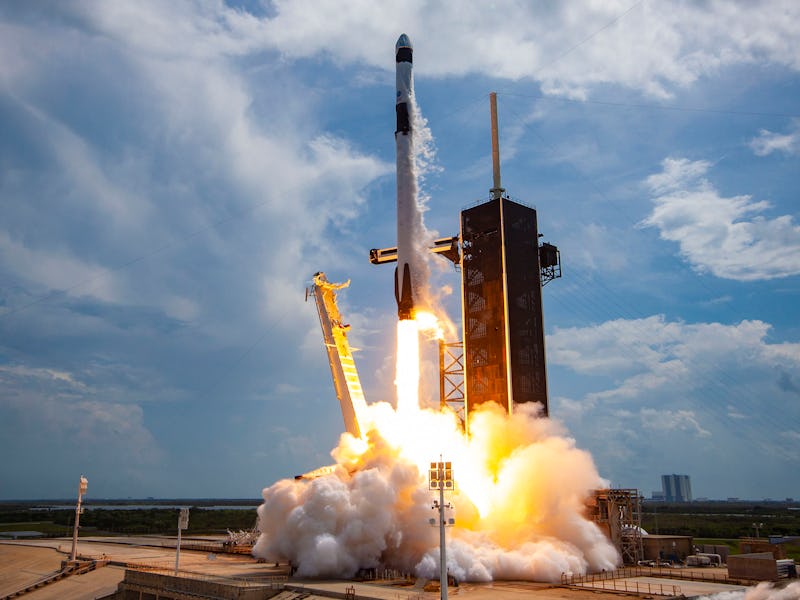SpaceX is about to break an incredible record for rocket reusability
Elon Musk's spacefaring firm will raise the bar with its Falcon 9.

SpaceX is about to reach a new milestone in the race to reuse rockets.
On Sunday, SpaceX CEO Elon Musk revealed on Twitter the company is about to launch the same rocket for the seventh time.
Want to learn more about SpaceX’s quest to reuse rockets? Check out Musk Reads+ for exclusive interviews, analysis, and more.
The launch is expected to send up the 16th batch of 60 Starlink satellites. It will take place at Space Launch Complex 40 at the Cape Canaveral Air Force Station in Florida, and is scheduled for Monday evening at 9:34 p.m. Eastern (although the timing could change).
After the launch, SpaceX plans to land the booster on the Of Course I Still Love You droneship, which would also set a record as the first time that SpaceX has landed the same booster seven times.
The feat is an impressive step forward in SpaceX's goal to reuse rockets and reduce the costs of spaceflight. Reusing the booster saves about 75 percent of the overall price tag, according to Musk. At the time he made that claim, the Falcon 9's price tag was around $60 million.
Reusing rockets is critical for SpaceX to achieve its more ambitious missions. The company is developing the Starship, a giant stainless steel ship designed to send humans to Mars and beyond. The ship can ostensibly be refueled on Mars, enabling astronauts to return home. But that also requires the technology to ensure rockets can land, and then take off again.
A Falcon 9 rocket coming in to land.
Monday's launch will be the seventh flight for this Falcon 9.
The B1049 core has previously flown on:
- The Telstar 18 mission on September 10, 2018. The landing marked the first time one of SpaceX's droneship, Of Course I Still Love You, caught more than four boosters in one year.
- The Iridium-8 mission on January 11, 2019. This launch marked the end of a $3 billion project over two years to upgrade the Iridium constellation with 75 satellites. This was also the first successful landing in 2019.
- The first Starlink mission on May 24, 2019. This mission sent up the first batch of 60 satellites.
- The third batch of 60 Starlink satellites, which took place on January 6, 2020.
- The eighth batch of satellites on June 3, 2020. The landing after this mission was also the first time SpaceX had flown and landed the same booster five times.
- The 11th batch of satellites on August 18, 2020.
The timing for SpaceX's latest launch is set, but it remains to be seen if it makes it. SpaceX originally planned to launch the booster on Sunday, but it delayed the launch with less than an hour to go because of "mission assurance."
It announced the delay via its Twitter page:
"Standing down from today’s launch of Starlink. Rocket and payload are healthy; teams will use additional time to complete data reviews and are now working toward backup opportunity on Monday, November 23 at 9:34 p.m. but keeping an eye on recovery weather"
The mission will support SpaceX's emerging Starlink internet connectivity constellation. This is designed to offer high-speed, low-latency internet access to almost anyone with a view of the night sky. A beta test is currently underway, and SpaceX plans to roll out coverage to nearly the whole of the populated world next year.
The Inverse analysis — Yet another delayed launch — this is not the first time this year that SpaceX has pressed pause on a launch. Musk posted on Twitter in October that "we will need to make a lot of improvements to have a chance of completing 48 launches next year." But it is undeniable the firm is on the cusp of meeting a big milestone.
The record translates to the progress in improving the economics of spaceflight. A reusable rocket has tradeoffs compared to a disposable rocket, as teams have to design for recovery and landing — a time-consuming and expensive process. United Launch Alliance CEO Tory Bruno claimed in April 2020 you need a fleet average of 10 flights to make reusing worthwhile, but Musk responded that three flights is enough.
But if things go according to SpaceX's plans, then the Falcon 9 is close to reaching those impressive double-digit reuses.
Update 11/24 5:30 a.m. Eastern time: An earlier version of this article stated that United Launch Alliance's CEO is Tony Bruno. This has since been corrected.
This article was originally published on